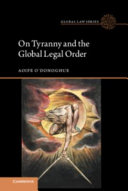Buy Breach of Contract: An Economic Analysis of the Efficient Breach Scenario PDF ebook by author Oliver Hofmann – published by Springer in 2021 and save up to 80% compared to the print version of this textbook. With PDF version of this textbook, not only save you money, you can also highlight, add text, underline add post-it notes, bookmarks to pages, instantly search for the major terms or chapter titles, etc.
You can search our site for other versions of the Breach of Contract: An Economic Analysis of the Efficient Breach Scenario PDF ebook. You can also search for others PDF ebooks from publisher Springer, as well as from your favorite authors. We have thousands of online textbooks and course materials (mostly in PDF) that you can download immediately after purchase.
Note: e-textBooks do not come with access codes, CDs/DVDs, workbooks, and other supplemental items.
eBook Details:
Full title: Breach of Contract: An Economic Analysis of the Efficient Breach Scenario
Edition:
Copyright year: 2021
Publisher: Springer
Author: Oliver Hofmann
ISBN: 9783030625252, 9781000317770
Format: PDF
Description of Breach of Contract: An Economic Analysis of the Efficient Breach Scenario:
“Efficient breach” is one of the most discussed topics in the literature of law and economics. What remedy incentivizes the parties of a contract to perform contracts if and only if it is efficient? This book provides a new perception based on an in-depth analysis of the impact the market structure, asymmetry of information, and deviations from the rational choice model have, comprehensively. The author compares the two predominant remedies for breach of contract which have been adopted by most jurisdictions and also found access to international conventions like the Convention on Contracts for the International Sale of Goods (CiSG): Specific performance and expectation damages. The book illustrates the complexity such a comparison has under more realistic assumptions. The author shows that no simple answer is possible, but one needs to account for the circumstances. The comparison takes an economic approach to law applying game theory. The game-theoretic models are consistent throughout the entire book which makes it easy for the reader to understand what effects different assumptions about the market structure, the distribution of information, and deviations from the rational choice model have, and how they are intertwined.





